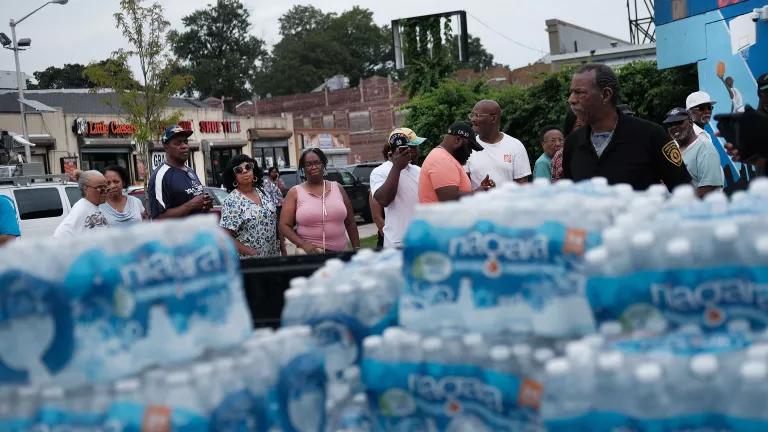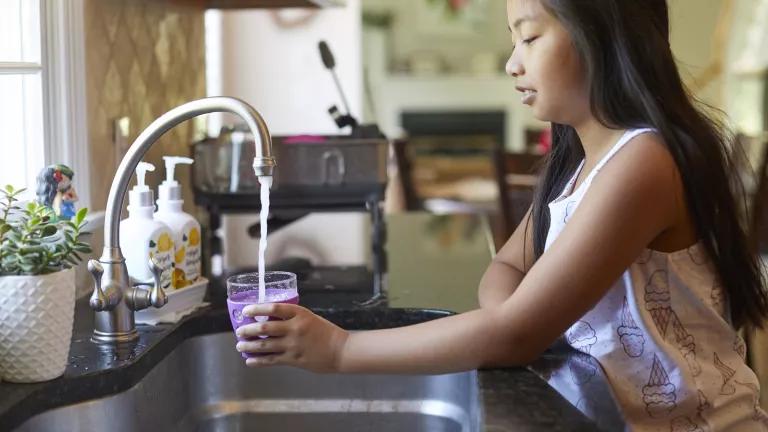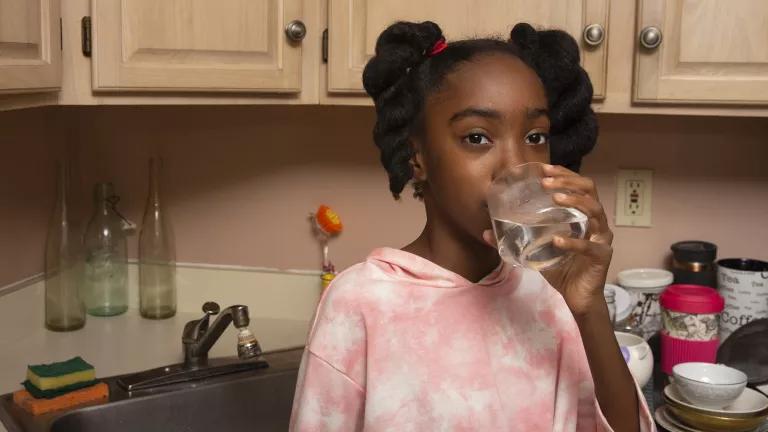Governors: Safe, Clean Water Is Essential in COVID-19 Crisis

“Wash your hands.” “Stay at home.” We hear this sound advice repeatedly during the COVID-19 crisis. But you can only follow these directives if you have water—for handwashing, drinking, cooking, cleaning, and sanitation. Unfortunately, many people in the United States do not have running water in their homes because their water has been shut off. For some, the shutoffs have predated the crisis. That’s why we are calling on governors to immediately issue executive orders to require moratoria on shutoffs and reconnections of water service in occupied residences. Many governors have taken steps in this direction and it’s time for all governors to ensure that all homes have running water. As the virus continues to spread across the country, there is no time to waste.
How some states are addressing the problem
[See this blog for the latest updates on specific state moratoria. The list of states below is no longer being updated.]
In the absence of Congressional action to ensure access to water during this crisis, some states have begun filling in the void. To date [updated 8/9/20], at least 16 states plus the District of Columbia and Puerto Rico have, often through executive order, established statewide moratoria on water shutoffs. The states that currently have, or previously had, statewide moratoria are: CA, DC, KY, MD*, ME, MI, NY, PR, WA, WI, DE [expired 7/1], IN [expired 8/14 here and here], KS [expired 5/31 here and here], MS [expired 5/26], MT [expired 5/24 except for members of "vulnerable populations" sheltering at home], NC [expired 7/29, except for privately owned utilities], NH [expired 7/15], and OH [expired 7/10].
In Michigan, thanks to the efforts of local groups highlighting the urgency of this crisis with NRDC’s support, Governor Gretchen Whitmer issued the first-in-the-nation Executive Order requiring public water systems to reconnect all occupied homes in their service area. The advocates are now working to secure emergency water distribution stations and ensure that water systems are transparent in their efforts to identify occupied homes without running water.
California’s Governor Newsom quickly followed, heeding the call of community advocates joined by NRDC establishing a shutoff moratorium and requiring reconnections of residences disconnected. (Unlike Michigan, however, the reconnection order was retroactive only to March 4, 2020.)
Preventing shutoffs only addresses part of the problem; reconnections are also critical to protect families and communities during this crisis. Estimates of the total number of people across the country whose water has been shut off in a given year range from hundreds of thousands to as many as several million. For example, in Detroit alone water was shut off to 23,000 homes in 2019, and there were 141,000 total service cutoffs in recent years; in New Orleans there were over 9,000 homes whose water needed to be reconnected during the COVID-19 outbreak; in California NRDC's review [updated 5/8/20] of self-reported utility data for 2019 found that at least 350,000 Californians experienced their water being shut off at least once last year. Indeed, a California study by Pacific Institute showed that while most utilities had a 4 percent disconnection rate or less, more than a third had disconnection rates from 7 percent to as high as 30 percent. This could translate into millions of homes disconnected nationally.
In addition, some states have required leniency regarding other collection activities, including waiver of late fees, interest, and related charges on overdue bills; and requiring utilities to allow extended repayment plans on arrears after the health crisis ends.
Detailed recommendations
As more governors are stepping up on this issue, we have compiled the best practices from around the country, and added a few of our own, that would protect people and their families during this crisis. A governor’s executive order or other directive should include the following practices:
- Establish water shutoff moratorium: Direct all water utilities to stop residential water shutoffs for the duration of the COVID-19 crisis, extending until at least 120-days after the end of the declared health emergency to allow people to regain their financial footing.
- Require water reconnections: Direct all water utilities to take all necessary steps to safely reconnect services as quickly as possible to all currently occupied residences that have been disconnected due to nonpayment.
- Don’t put the burden on residents: Utilities must proactively identify residences in need of reconnection, based on records of all disconnections, rather than waiting for individuals to request reconnection.
- Reconnect water safely: Utilities must take proactive measures (consistent with guidelines to be issued by the state) to ensure that restoring service does not increase the risk of exposure to biological or chemical contaminants – particularly in any cases where a shutoff has lasted a matter of weeks or months rather than days.
- Provide guidance for safe connections: Direct the state’s environmental agency to immediately issue guidelines for how to ensure reconnections to water systems are completed as safely as possible, including flushing and other recommendations. Michigan’s guidelines provide a good example, as do the guidelines issued by the People's Water Board.
- Provide emergency water: Provide emergency water for households that are waiting for the restoration of water service or who otherwise lack safe tap water. This can be done by establishing water distribution stations at various spots in the community that are available to all who lack safe water. Direct relevant state, county, local, and/or utility officials to ensure that this happens, and that the availability and location of these stations is widely publicized.
- Waive late fees, collections, and repayments: Direct all water utilities to waive late fees, interest, and related charges; suspend the use of liens (including lien sales and enforcement of liens) as a collection practice; suspend reporting of unpaid bills to any consumer reporting agency and the sale of unpaid receivables to private collection agencies; and provide extended repayment plans after the crisis.
- Require utilities to report on compliance: Establish reporting requirements – both to the state and the public – to ensure that utilities comply with the state’s directive to reconnect water service to all occupied residences and end shutoffs.
- Provide ample notice to customers: Water utilities should take steps to inform customers of these new policies, including through:
- General publicity in the appropriate language for the community.
- A mailer to the last known occupant of any residence that was shutoff.
- Prominent information in future customer bills concerning the extended repayment options, waiver of late fees, and other changes in collections practices.
Of the 50,000 community water systems across the United States, hundreds have announced shutoff moratoria, and a smaller number have committed to reconnections. Some states have imposed shutoff moratoria only on privately owned utilities. These limited moratoria have come through orders of state utility commissions, which in nearly all states do not have the authority to regulate the publicly owned systems that serve the vast majority of people. (WI, IN, and ME are notable exceptions; in those three states, utility commissions exercise full oversight of all water utilities. Notably, all three have imposed shutoff moratoria.)
No one, regardless of race, gender, income, or geographic location, should go without utility services at any time, especially not during a pandemic. In this era of stay-at-home orders, your ability to protect yourself, your family, and your community—by heeding the direction of CDC and public health officials to wash your hands, clean and disinfect your home, and stay at home—should not depend on whether you can afford your water service, nor on which utility happens to provide it.
Ending water shutoffs and reconnecting water protects us all. Governors have the power in this emergency to guarantee those protections for everyone. They should use it.
NOTES:
*The order in MD refers to utility "companies," but the state's Office of People's Counsel interprets the order as applying to both publicly and privately owned water utilities.




